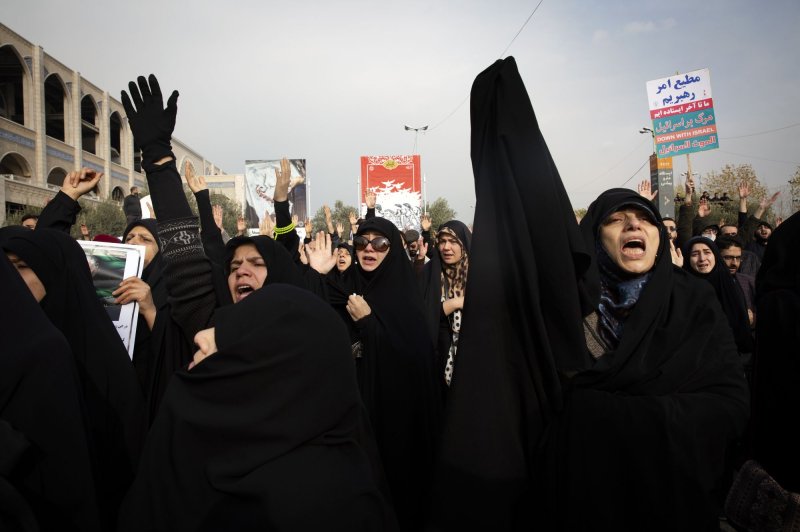Iranian women take to the streets as they mourn the death of Iranian Revolutionary Guard Commander Qassem Soleimani during a demonstration after Friday prayer in Tehran. Photo by Maryam Rahmanian/UPI |
License Photo
Two decades ago, commanding Central Command, Marine Gen. Anthony Zinni cautioned the Clinton administration over the possibility of a conflict with Iran. His warning was brilliantly couched in six words: "Don't provoke a Bay of Goats!" The reference was to the Kennedy administration's disastrous invasion of Cuba at the Bay of Pigs in April 1961.
The Trump administration would be wise to heed that warning despite the preponderance of American conventional military power and the certainty that Iran will retaliate for the death by drone of Iran's Quds force commander Qassem Suleimani at the Baghdad airport. Many Americans in uniform will rightly regard his killing as justice finally served. Suleimani was responsible for killing and wounding many hundreds of U.S. service personnel in Iraq largely with explosive formed projectiles. But more importantly, he was Iran's general in charge in the Middle East whose line of command extended from Lebanon through Syria to Iraq and the Gulf to Yemen.
Yet this tactical "success" is at best momentary. Here, history beyond the Bay of Pigs may be relevant. When U.S. President George W. Bush launched Operation Iraqi Freedom in March 2003, the "what next question" was ignored. After all, as the vice president proudly predicted then, the Iraqi people will greet the liberators with candy and flowers. Nearly 17 years later, RPG-7s, bullets and improvised explosive devices became surrogates for the candy and flowers.
In August 1964, the Johnson administration used reports of a nonexistent second torpedo attack against two U.S. Navy destroyers in the Tonkin Gulf as grounds for a congressional resolution authorizing a war in Vietnam. A decade and 58,000 dead Americans later, Vietnam was lost.
If one wants evidence of how this current situation could explode, June 1914 and the assassination of Austrian Archduke Franz Ferdinand and his pregnant wife, Sophie, near that infamous bridge in Sarajevo, Yugoslavia, precipitated the first World War. This is not 1914. However, the greater Middle East is a tinderbox.
Prior to Suleimani's death, Iraq was in chaos, unable to form a new government. Huge protests continued over jobs, standards of living, basic rights and against corruption. The Syrian offensive in Idlib reportedly created another quarter-million refugees with nowhere to go. Lebanon is in a financial crisis, having run of out money. Yemen remains engaged in civil war.
Meanwhile, Turkey is intervening in Libya to support the government in Tripoli. Russia supports the opposition. Israel's Prime Minister Benjamin Netanyahu is calling on the Knesset to grant him immunity as long as he is in office. And further afield, "Rocket Man" Kim Jong Un is promising some sort of deferred "Christmas present" for America.
Here, President Donald Trump has been impeached and faces a Senate trial. Possibly worse, the Supreme Court rulings on three cases over release of Trump's tax and business records are expected in March. And the trade war with China, despite the promises, has not been resolved yet.
Against this background, the unasked and infamous question is what is the administration's strategy and game plan for what comes next with Iran? Does the administration believe this attack was a one-off and a sufficient signal to deter further Iranian actions? Clearly, the White House must be planning for retaliation against Americans and American installations in the region. However, that is a precaution, not a strategy.
Iran's objectives are threefold. First is to drive the Americans from the region beginning in Iraq. Second is to break the sanctions. And third is to build its influence.
About the first, after the five retaliatory air strikes against Kataib Hezbollah, many Iraqi politicians were demanding America's withdrawal. Significantly, perhaps the most powerful Iraqi politician, the Grand Ayatollah Ali al Sistani also decided it is time for America to go. Suleimani's death most likely will strengthen those in the America-out camp.
The current American strategy, as can best be determined, is less a strategy and more a "wait and see" policy. That happened with grim results in 1914 although the rush to mobilize armies clearly was a catalyst for war. In 1964, "wait and see," had it been adopted, might have prevented the Vietnam War. It did not.
Today, make no mistake: Iran will retaliate. What then is the administration's plan? The proper objective of bringing some stability to Iraq will be overwhelmed. Instead of a proxy war, Iraq could become the battlefield in a conflict we are unlikely to win and in which the Iraqi people will be the biggest losers.
Harlan Ullman is UPI's Arnaud de Borchgrave distinguished columnist, as well as a senior adviser at the Atlantic Council. He served as a professor of military strategy at the National War College and the Naval War College. His latest book is "Anatomy of Failure: Why America Has Lost Every War It Starts." Follow him @harlankullman.















